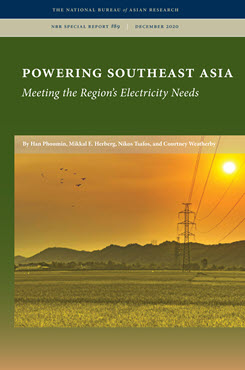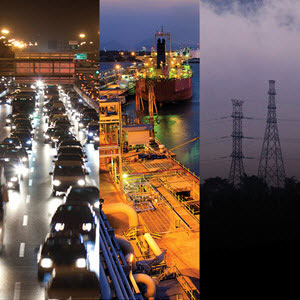NBR Special Report no. 89
The Need for Quality Infrastructure to Meet Rising Energy Demand in the ASEAN Region
This essay examines the importance of sustainable quality infrastructure to meet growing energy demand in the Association of Southeast Asian Nations (ASEAN) region.
EXECUTIVE SUMMARY
MAIN ARGUMENT
Although the ASEAN region’s fast economic growth in the past decades has improved the quality of life for millions of people, it has also increased the pressure on energy security and sustainability. Fossil fuels (oil, coal, and natural gas) remain the dominant energy source to meet rising demand. In particular, the share of coal in power generation is expected to rise tremendously in the mix by 2040. Policy reforms are also taking place at different speeds across Southeast Asia, reflecting the characteristics of each country in the region. ASEAN will need to increase investment in high-quality infrastructure, clean technologies, and clean fuels such as renewables to ensure that development is sustainable.
POLICY IMPLICATIONS
- The fast economic growth in ASEAN may not be sustainable if growth is pursued at the expense of environmental and social damage. High-quality infrastructure and the deployment of clean coal technology will play crucial roles for the future sustainability of the region’s development.
- Expanding the use of liquefied natural gas (LNG) will have significant implications for energy security and the environment in the ASEAN and East Asia region. LNG can help meet demand for power generation, lessen coal use in the power mix, and act as a bridge fuel toward a clean energy future. Promoting natural gas use will affect future gas consumption and investment in gas-related infrastructure and will bolster trade with the U.S.
- The Covid-19 pandemic presents an opportunity for leaders to boldly increase renewable and green energy investment as part of economic recovery packages; revise energy policies, such as by removing fossil fuel subsidies; and introduce more clean energy technology to decarbonize emissions. Regional governments and financial institutions may need to promote investment in green projects through green bonds or other instruments like carbon credits.
Han Phoumin is a Senior Energy Economist at ERIA and an Asia EDGE Fellow (nonresident) at the National Bureau of Asian Research.



